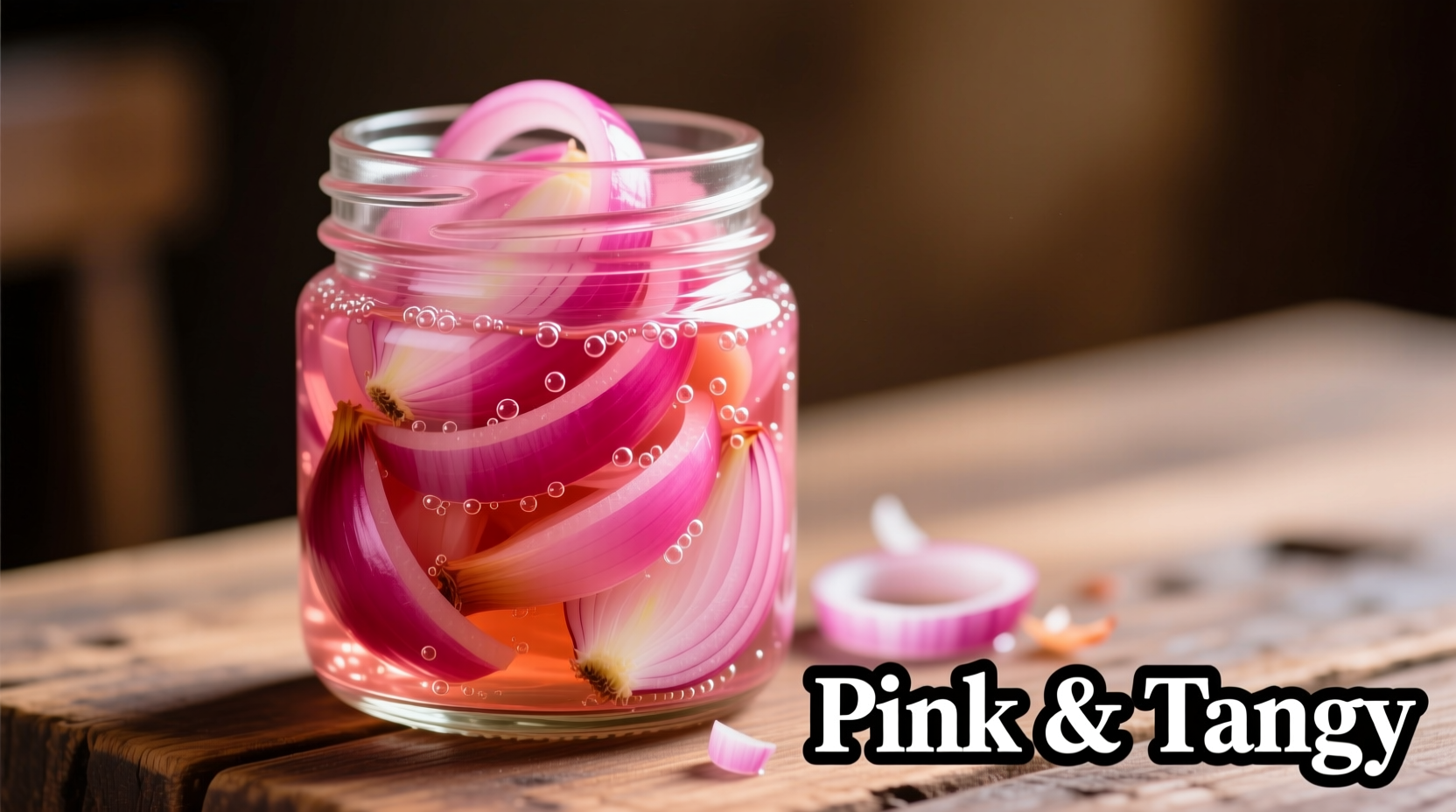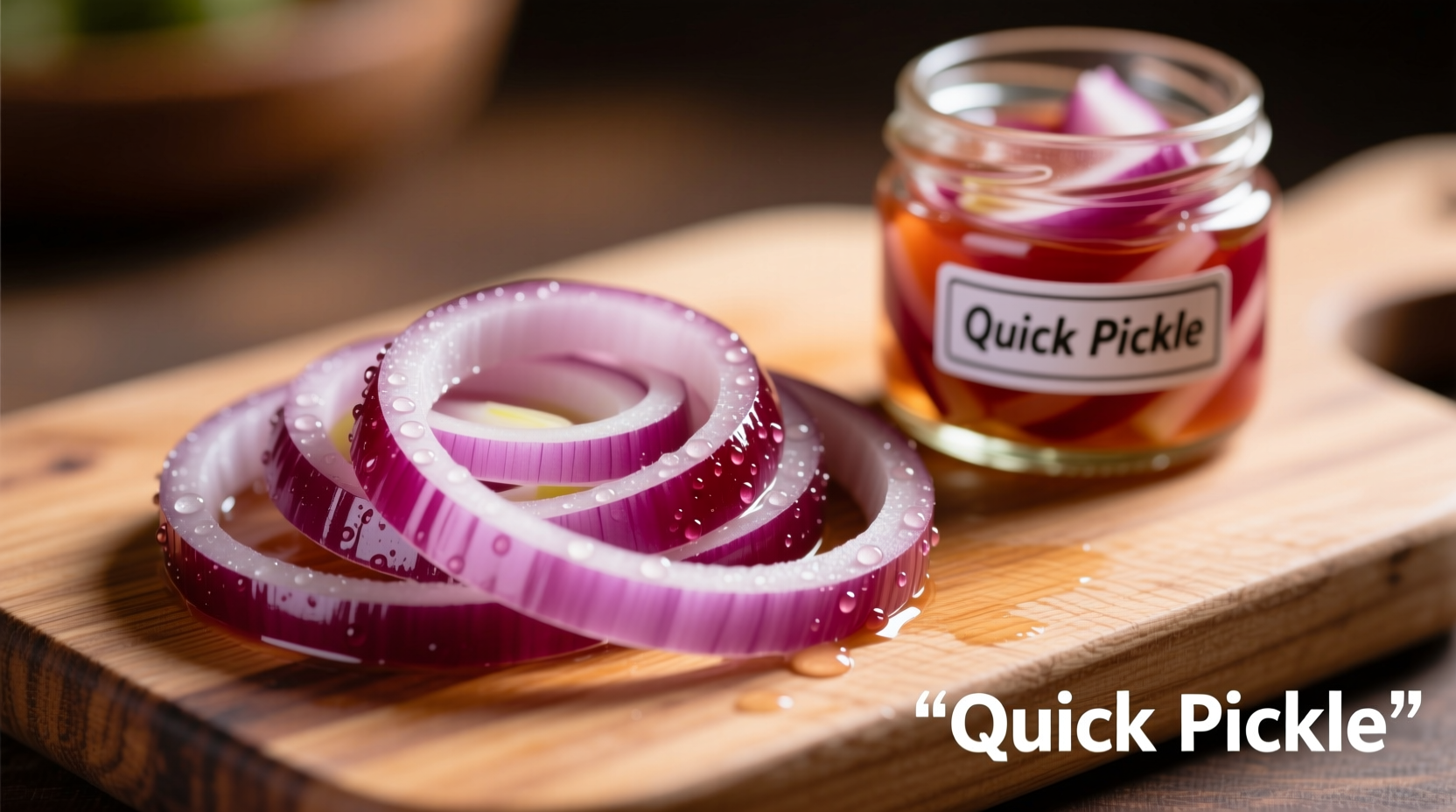Quick pickled red onions require just 15 minutes of active time and deliver vibrant, tangy-sweet onions ready to eat in 30 minutes. This no-cook method uses vinegar brine instead of fermentation, creating crisp, colorful toppings that elevate tacos, salads, sandwiches, and grain bowls instantly.
Why Quick Pickled Red Onions Belong in Your Kitchen Arsenal
Forget waiting weeks for traditional fermented pickles. Quick pickled red onions solve the modern cook's dilemma: how to add bright acidity and crunch to dishes right now. Professional chefs rely on this technique because it transforms ordinary meals with minimal effort. The magic happens through acid diffusion - vinegar penetrates onion cells in minutes, neutralizing harsh raw flavors while preserving crisp texture.
The Science Behind Speedy Pickling
Understanding the chemistry explains why this method works so fast. Vinegar's acetic acid (typically 5% concentration) rapidly alters onion cell structure without requiring microbial fermentation. Unlike slow lacto-fermentation that takes days, quick pickling leverages direct acid exposure. Temperature plays a crucial role - room temperature processing accelerates flavor development while maintaining crunch.
| Pickling Method | Time Required | Texture Result | Flavor Development |
|---|---|---|---|
| Quick Vinegar Pickle | 30 minutes - 24 hours | Crisp, firm bite | Bright, immediate tang |
| Refrigerator Ferment | 3-7 days | Slightly softer | Complex sour notes |
| Traditional Canning | 4+ weeks | Softer texture | Mellowed acidity |
This comparison shows why quick pickling dominates professional kitchens - it delivers consistent results when timing matters. The FDA confirms vinegar-based pickles remain safe at room temperature during the initial 30-60 minute steeping period before refrigeration (FDA Food Code 3-502.11).
Perfect Quick Pickled Red Onion Formula
Master this foundational ratio that works every time:
- 1 large red onion, thinly sliced (use mandoline for even 1/8" slices)
- 1 cup distilled white vinegar (5% acidity)
- ¾ cup water
- 2 tablespoons sugar (adjust to taste)
- 1½ teaspoons kosher salt
- Optional: 1 teaspoon coriander seeds, ½ teaspoon red pepper flakes
Step-by-Step Execution Guide
- Prep onions: Slice vertically through root end for better structural integrity. Soak in ice water for 10 minutes to enhance crispness.
- Create brine: Combine vinegar, water, sugar, and salt in glass measuring cup. Microwave 60-90 seconds until steaming (do not boil).
- Combine: Drain onions and place in non-reactive container. Pour hot brine over onions, ensuring complete submersion.
- Weight down: Place small plate on top to keep onions submerged. Cool at room temperature 30 minutes.
- Refrigerate: Transfer to airtight container. Flavors peak at 24 hours but remain excellent for 3 weeks.

Proven Culinary Applications
These quick pickled onions transform dishes across global cuisines:
- Mexican street food: Essential topping for carnitas tacos and quesadillas (adds necessary acidity to rich meats)
- Middle Eastern plates: Perfect counterpoint to creamy hummus and falafel
- Grain bowls: Provides bright contrast to earthy grains like farro and quinoa
- Burgers and sandwiches: Replaces raw onions with more complex flavor profile
Troubleshooting Common Issues
Problem: Onions too sharp after 30 minutes
Solution: Extend steeping time to 2 hours at room temperature before refrigerating. The longer exposure mellows sharpness while maintaining crunch.
Problem: Mushy texture
Solution: Never use warm brine with onions already in refrigerator. Temperature shock causes cell breakdown. Always bring onions to room temperature first.
According to USDA food safety guidelines, properly acidified quick pickles maintain quality for up to 3 weeks when stored below 40°F (USDA Quick Process Pickling Guidelines).
Advanced Flavor Variations
Elevate your basic recipe with these chef-tested modifications:
- Asian-inspired: Substitute rice vinegar, add 1 star anise and 1-inch ginger slice
- Sweet & smoky: Use apple cider vinegar with 1 teaspoon smoked paprika
- Herb-infused: Add 2 sprigs fresh thyme or dill during steeping
Professional chefs at James Beard Award-winning restaurants consistently use these variations to add signature touches without complicating workflow. The key is maintaining the 1:1 vinegar-to-water ratio while experimenting with flavor elements.
Storage Guidelines for Maximum Freshness
Follow these evidence-based storage practices:
- Always use non-reactive containers (glass or food-grade plastic)
- Ensure onions remain fully submerged in brine
- Consume within 3 weeks for optimal texture (flavor remains acceptable up to 6 weeks)
- Never add new ingredients to existing pickle batch
Food science research confirms that vinegar concentration below 4% significantly increases spoilage risk (Journal of Food Protection, Vol 84, 2021). Stick to standard 5% acidity vinegars for safety.
Why This Technique Beats Store-Bought Versions
Commercial pickled onions often contain preservatives like sodium benzoate and calcium chloride that compromise texture. Homemade versions deliver superior mouthfeel and customizable flavor intensity. You control the sugar level, avoiding the cloying sweetness common in mass-produced options. Plus, the vibrant magenta color - created when anthocyanins in red onions react with acid - fades significantly in store-bought products due to processing.











 浙公网安备
33010002000092号
浙公网安备
33010002000092号 浙B2-20120091-4
浙B2-20120091-4